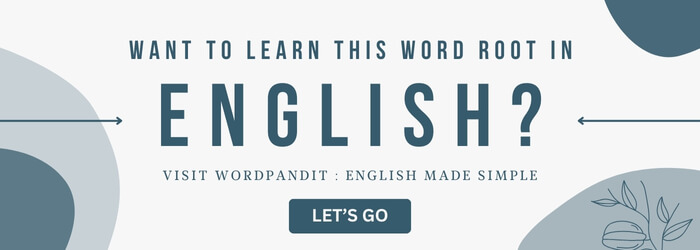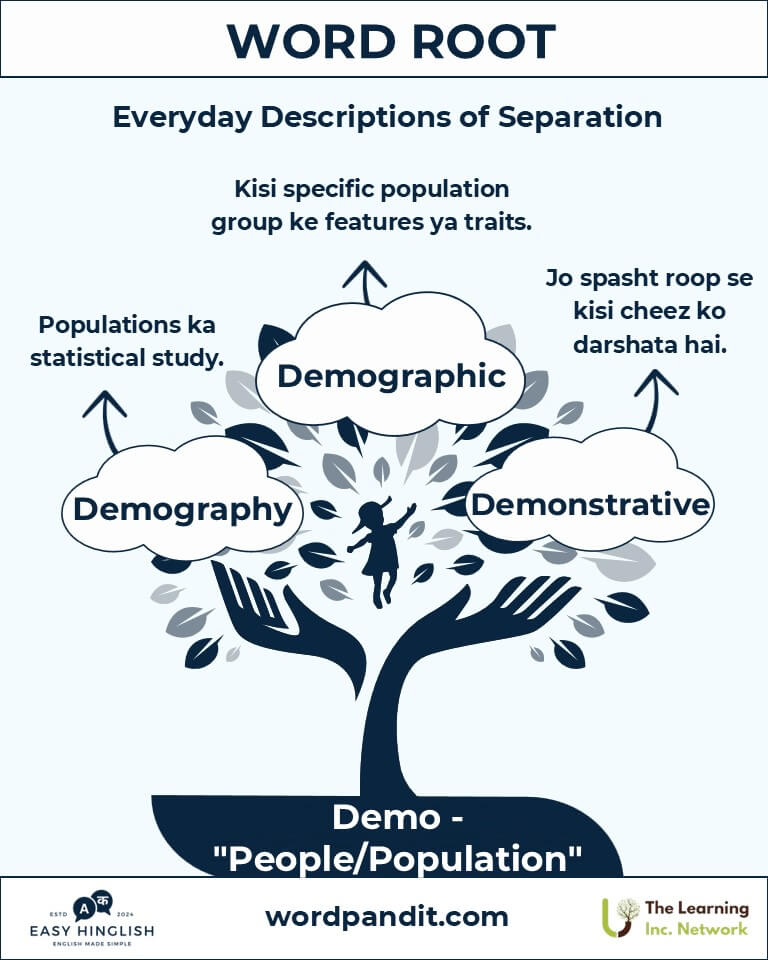Demo: Understanding the Power of People and Populations
Explore the origins, meanings, and applications of the Greek root "Demo," meaning "people." From ancient democratic ideals to modern demography and epidemiology, uncover how this root shapes words that define human societies, governance, and collective identities.

Table of Contents
- Introduction: The Power of the People
- Etymology and Historical Journey
- Mnemonic: Unlocking the Power of Demo
- Common Demo-Related Terms
- Demo Through Time
- Demo in Specialized Fields
- Illustrative Story: Demo in Action
- Cultural Significance of the Demo Root
- The Demo Family Tree
- FAQs About the Demo Word Root
- Test Your Knowledge: Demo Mastery Quiz
- Conclusion: The Living Legacy of Demo
Introduction: The Power of the People
The root "Demo" originates from Greek, meaning "people." It forms the foundation of words that define human collectives, governance, and social structures. From democracy to demography, "Demo" remains central to understanding how people shape their world.

Etymology and Historical Journey
The Greek word "demos" referred to "the people" or "the populace." In ancient Greece, democracy was established as a form of governance where people had a voice in decisions. Over time, "Demo" has evolved into various words such as demography (study of populations) and epidemic (affecting a population).
Mnemonic: Unlocking the Power of Demo
To easily remember the meaning of "Demo," think of "Democracy" – a government by the people. Another way is associating "Demo" with "Demographics" – the statistical study of populations. These associations make it easier to recall the meaning of "Demo."
Common Demo-Related Terms
- Democracy: A system of government where the people have the power to make decisions.
- Demographic: A particular section of a population, often studied in statistics.
- Demagogue: A leader who seeks support by appealing to popular desires and emotions.
- Demography: The statistical study of human populations.
- Epidemic: A disease or condition affecting a large number of people in a population.
Demo Through Time
Over centuries, words derived from "Demo" have evolved to describe various aspects of society. Here are some key developments:
- Ancient Greece: Democracy was first introduced as a system where citizens could participate in governance.
- 18th-19th Century: Demography emerged as an important field for studying population trends and planning societies.
- Modern Times: Epidemics and pandemics highlight how "Demo" plays a role in public health and collective behavior.
Demo in Specialized Fields
- Politics: Democracy remains the most widely discussed form of governance worldwide.
- Sociology: Demographic studies are essential in understanding population shifts, trends, and behaviors.
- Medicine: Epidemiology (study of diseases within populations) is a crucial branch of public health.
- Marketing: Businesses analyze demographic data to target audiences effectively.
Illustrative Story: Demo in Action
In a bustling city, a young woman named Maya noticed that her community lacked proper healthcare facilities. Inspired by the principles of democracy, she mobilized local residents to petition the government. Using demographic data to highlight the urgent need, she succeeded in getting a new clinic established. This story reflects how understanding "Demo" empowers people to bring meaningful change.
Cultural Significance of the Demo Root
"Demo" has influenced various aspects of global culture. From democratic movements fighting for people's rights to demographic studies shaping policies, this root remains central to societal progress.

The Demo Family Tree
- Democracy: Rule by the people.
- Demography: Study of populations.
- Demagogue: A leader who manipulates public emotions.
- Epidemic: A widespread disease affecting people.
- Pandemic: A global-scale epidemic.

FAQs About the Demo Word Root
Q1: "Demo" ka kya matlab hai modern English mein?
"Demo" ka matlab hai "people" (लोग) aur yeh un shabdon mein use hota hai jo populations, governance, aur societal structures se jude hain.
Q2: Demo root ka origin kya hai?
Demo root ka origin Ancient Greek word "demos" (people/populace) se hai.
Q3: Demography aur demographics mein kya fark hai?
• Demography (जनसांख्यिकी): Population ka statistical study (जैसे size, structure, aur dynamics ka analysis).
• Demographics (डेमोग्राफिक्स): Population ke specific data sets ya characteristics (जैसे age, gender, income).
Q4: Marketing mein "Demo" ka kya role hai?
Marketing mein, "Demo" demographics mein dikhta hai, jo businesses ko specific audience segments ko target karne mein madad karta hai.
Q5: "Demagogue" shabd ka kya matlab hai?
"Demagogue" ek leader ko kehte hain jo popular desires aur prejudices ka use karke power gain karta hai. Yeh term aksar negative connotation rakhta hai.
Q6: History mein democracy ka kya significance tha?
Democracy (demo = people + cracy = rule) ne governance ke ek naye idea ko introduce kiya, jahan log apne decisions mein directly shamil hote the, jaise Ancient Athens mein.
Q7: Epidemiology aur "Demo" root ka kya connection hai?
Epidemiology (Demo = people + logy = study) diseases ka study karta hai within populations, jo public health mein important hai.
Test Your Knowledge: Demo Mastery Quiz
1. "Demo" root ka kya matlab hai?
2. Ek leader jo emotions ka use karke power gain karta hai use kya kehte hain?
3. Populations ka study kya kehlata hai?
4. Everyday language ya common people ke liye kaunsa term use hota hai?
5. "Demo" aur "cracy" ke combination se kya term banta hai?

Conclusion: The Living Legacy of Demo
The root "Demo" continues to shape the modern world, influencing governance, health, and society. Understanding this word root helps us appreciate the role of people in shaping history and the future.







